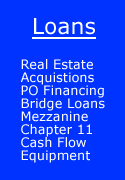
Bookmark This Site
Formulas for Cost of Capital
There are numerous formulas to determine your company's financial performance. These are further broken down into those that are appropriate for investors, lenders, operators and owners. Get a complete description from our financial performance and venture capital reports section.
Finance = Investment
Capital Budgeting uses two different formulas to determine the wisdom of an investment. They are:
Finance = Investment = Fixed Assets + Working Capital
Investment represents that allocation of scarce funds to future production (as contrasted to consumption). Such allocation is only rational if the value of the future production is greater than the value of the present resources sacrificed.
Return on Investment (ROI) is the measure of the excess value, and is expressed as a percentage ratio.
Profit x 100/ Investment = ROI
Cost of Capital = ((Repayment - Investment) x 100)/Investment
These two formulas can be used to calculate the optimum debt to equity ration necessary to finance further growth or acquisition. Simply put will this investment make more money than the current use of capital employed.
Financial Leverage
Leverage denotes the use of fixed-income securities, debt, and preferred stock to increase returns to stockholders and owners. Note that preferred stock payments are not tax deductible.
Equity capital is more costly than debt because it requires higher premiums for risk and interest on debt is tax deductible while dividends and equity capital are not.
Financing acquisitions, developing venture capital (to be used for business growth and expansion) and adding debt to the mix, lowers the effective cost of capital and leverages the founders shareholder interest.
This method of adding debt to new equity can increase Return on Equity (ROE) by as much as 50%.
Capital Asset Pricing Models
Because of the complexity of calculating optimum investment strategies and ratios between equity and debt methods, it is possible to arrive at a screening method for investments by a process similar to Capital Asset Pricing Methods (CAPM) . This system calculates the "hurdle rate" or minimum return required to consider an investment worthy of consideration.
Another approach seeks to calculate hurdle rates that calculate acceptable risks in the general market. These include
Risk Free Rate of Government Bonds, Premium for Demand Risks, Premium for Supply Risks, Premium for Financing Risks. This often translates to an 18 - 24% risks.
Determining True Value
Inflation, taxes, depreciation, and international currency fluctuations may also need to be considered. One method is to calculate both Internal Rates of Return (IRR) and Net Present Value (NPV) using various cash flows and Discount Rates to determine the wisdom of investment. These methods are explained in detail in our special venture capital reports and valuations section.
 |
"Our
goal is to provide you the best funding tools available and to get your
project
funded quickly."
Bill
McCready, CEO
Venture Planning Associates,
"Out
of the hundreds of sites offering business plan products and services, your VenturePlan
site is among the best, if not the best. "
Mike Rischard CPA, President, Agilecor
"When we received first round funding ($5 million) the VC firm asked us to show them how our financial models were created. They wanted to use OUR TEMPLATE (which we developed from the 7 Venture Capital Reports) to help them evaluate alternative scenarios for their portfolio companies!" Michael .Lay, CFO, e-Commerce Internet Company
Home
| Affiliate Program | About
VPA | Principals & Experts | Fees
Recent Projects | Venture
Capital Reports | Disclaimer | Privacy
| Site Map |
Venture Planning
Associates, Inc.
Ph: 888.404.1212 mailto:capital@ventureplan.com
copyright 1997-2006 Venture Planning Associates, Inc. All Rights Reserved





